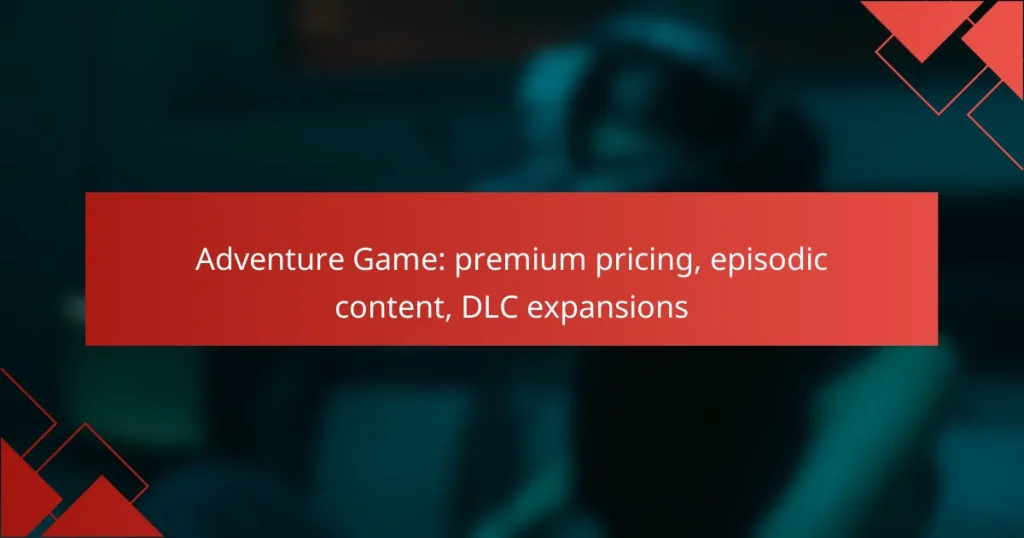In the competitive landscape of adventure games, premium pricing strategies are essential for reflecting the quality and unique experiences offered to players. By utilizing tiered pricing and episodic content, developers can enhance player engagement and foster community anticipation. Additionally, DLC expansions play a crucial role in extending gameplay and enriching narratives, ensuring that players remain invested in the adventure long after the initial release.

What are the premium pricing strategies for adventure games in the UK?
Premium pricing strategies for adventure games in the UK often involve setting higher price points to reflect the quality and unique content offered. These strategies can include tiered pricing, value-based pricing, and subscription services, each catering to different consumer preferences and market dynamics.
Tiered pricing models
Tiered pricing models involve offering multiple versions of a game at different price points, allowing players to choose based on their budget and desired features. For instance, a standard edition may be priced around £30, while a deluxe edition with additional content could reach £50 or more.
This approach can attract a wider audience, as it provides options for casual players and dedicated fans alike. However, developers must ensure that the higher tiers offer substantial value to justify the increased cost.
Value-based pricing
Value-based pricing focuses on setting prices based on the perceived value of the game to the consumer rather than solely on production costs. This strategy requires thorough market research to understand what players are willing to pay for unique features, story depth, or immersive experiences.
For example, if a game includes extensive narrative choices and high-quality graphics, it may command a higher price. Developers should regularly gather player feedback to adjust pricing strategies effectively and maximize revenue.
Subscription services
Subscription services allow players to access a library of adventure games for a monthly fee, typically ranging from £5 to £15. This model can enhance player engagement by providing continuous access to new content and updates.
However, developers must ensure a steady stream of quality games to retain subscribers. Offering exclusive titles or early access can incentivize players to commit to the subscription, making it a viable option for both consumers and developers in the competitive gaming market.

How does episodic content enhance player engagement?
Episodic content enhances player engagement by providing regular, bite-sized experiences that keep players returning for more. This format allows developers to build narratives over time, creating anticipation and fostering a community around each release.
Regular content updates
Regular content updates in episodic games ensure that players have fresh experiences to look forward to, often on a schedule that can range from weekly to monthly. These updates can introduce new storylines, characters, or gameplay mechanics, which keeps the game dynamic and engaging. For example, a game might release a new episode every six weeks, allowing players to explore new challenges and environments consistently.
Developers can also respond to player feedback between episodes, making adjustments or introducing features that enhance gameplay. This responsiveness can significantly improve player satisfaction and retention.
Community involvement
Community involvement is crucial in episodic games, as it allows players to feel invested in the game’s development. Many developers create forums or social media groups where players can discuss episodes, share theories, and provide feedback. This interaction fosters a sense of belonging and encourages players to stay engaged with the game.
Additionally, some games incorporate player choices into future episodes, making the community’s input directly influence the game’s direction. This approach not only enhances engagement but also builds a loyal player base eager to see how their contributions shape the narrative.

What are the benefits of DLC expansions for adventure games?
DLC expansions for adventure games provide players with enhanced experiences through additional content, extending the life of the game. These expansions often include new gameplay elements, enriching the overall narrative and offering fresh challenges.
Extended gameplay
DLC expansions typically add several hours of gameplay, allowing players to dive deeper into the game world. This extended gameplay can range from a few additional missions to entire new chapters, keeping players engaged long after the main game concludes.
For example, an adventure game might offer a DLC pack that includes five new missions, each taking around one to two hours to complete. This not only prolongs the enjoyment but also encourages players to explore different strategies and approaches.
New storylines and characters
One of the key benefits of DLC expansions is the introduction of new storylines and characters, which can significantly enhance the narrative depth of the game. Players often appreciate fresh perspectives and plot twists that expand the original storyline.
For instance, a DLC might introduce a new character who has a unique backstory and motivations, allowing players to experience the game from a different angle. This can lead to richer interactions and a more immersive experience overall.

Which adventure games in the UK offer premium pricing and episodic content?
In the UK, several adventure games utilize premium pricing models and episodic content, allowing players to experience stories in manageable segments. This approach often enhances engagement and allows developers to refine gameplay based on player feedback.
Life is Strange series
The Life is Strange series is well-known for its episodic structure, where each episode is sold separately or as part of a season pass. Players can expect to pay around £4 to £8 per episode, with season passes typically offering a discounted rate for the entire series.
This series focuses on narrative-driven gameplay, where choices significantly impact the story. Players should be aware that purchasing episodes individually can lead to higher overall costs compared to buying a complete season upfront.
The Walking Dead series
The Walking Dead series, developed by Telltale Games, also follows an episodic format, with each season comprising multiple episodes sold individually or as a bundle. Prices for episodes generally range from £4 to £5, while a full season pass may cost around £20 to £25.
This series emphasizes player choices and moral dilemmas, making each episode a unique experience. It’s advisable to consider purchasing the season pass if you plan to play all episodes, as it often provides better value than buying them separately.

What are the key factors to consider when pricing DLC expansions?
When pricing DLC expansions, it’s essential to consider content quality and market demand. These factors significantly influence how players perceive value and their willingness to pay for additional content.
Content quality
The quality of the content in the DLC is a primary determinant of its price. High-quality expansions that offer new gameplay mechanics, engaging storylines, or extensive world-building can justify higher price points, often ranging from $10 to $30. Conversely, lower-quality content may need to be priced more competitively to attract buyers.
Consider including features like new characters, environments, or gameplay modes that enhance the overall experience. Players are more likely to invest in expansions that feel substantial and add meaningful content to the base game.
Market demand
Understanding market demand is crucial for setting the right price for DLC expansions. Researching competitor pricing and analyzing player feedback can provide insights into what gamers are willing to pay. Popular franchises may command higher prices due to established fan bases, while niche titles might require more modest pricing strategies.
Additionally, timing can affect demand. Launching an expansion during peak gaming seasons or alongside major updates can increase visibility and sales. Monitor trends and community discussions to gauge interest and adjust pricing accordingly.

How do players perceive the value of premium-priced adventure games?
Players often perceive premium-priced adventure games as offering higher value due to their quality, depth, and immersive experiences. This perception is influenced by factors such as engaging storytelling, high production values, and the inclusion of episodic content and DLC expansions.
Player reviews and feedback
Player reviews are crucial in shaping the perception of premium-priced adventure games. Positive feedback often highlights the game’s narrative depth, character development, and overall gameplay experience. Conversely, negative reviews may focus on perceived shortcomings like short playtime or lack of content updates.
Many players express their value perceptions through platforms like Steam or Metacritic, where they rate games based on their experiences. A game with a high rating often indicates that players feel they received good value for their investment, while lower ratings can signal dissatisfaction.
Comparison with free-to-play models
Premium-priced adventure games typically offer a complete experience upfront, while free-to-play models often rely on microtransactions for additional content. This difference can lead to varying perceptions of value; players may appreciate the straightforward nature of premium games without the pressure of in-game purchases.
However, free-to-play models can attract a larger audience due to their initial cost-free access. Players may enjoy trying a game without financial commitment, but they might encounter limitations that can affect overall enjoyment. Balancing quality and monetization strategies is essential for both models to meet player expectations.

What are the trends in adventure game pricing in the UK?
Adventure game pricing in the UK is increasingly characterized by premium pricing models, episodic content releases, and downloadable content (DLC) expansions. These trends reflect a shift in how developers monetize their games while providing players with ongoing experiences and additional features.
Increased focus on microtransactions
Microtransactions have become a significant trend in the adventure game market, allowing players to purchase in-game items, skins, or enhancements. This model enables developers to generate revenue beyond the initial game sale, often leading to a more personalized gaming experience.
In the UK, microtransactions can range from a few pounds for minor items to larger sums for exclusive content. Players should be mindful of their spending habits, as these small purchases can accumulate quickly.
Shift towards bundled content
Many adventure games are now offering bundled content, which includes the base game along with additional episodes or expansions at a discounted rate. This approach encourages players to invest in the entire series rather than just individual parts, enhancing overall engagement.
For example, a game might be priced at around £30 for the base version, while a complete bundle with all episodes could be offered for £50. This strategy not only provides value to consumers but also helps developers maintain a steady revenue stream as new content is released.

How can developers effectively market episodic content?
Developers can effectively market episodic content by focusing on building anticipation and maintaining engagement through strategic release schedules and targeted promotions. Highlighting unique features and storytelling elements can also attract players and encourage them to invest in the full experience.
Creating a Compelling Narrative
A strong narrative is essential for episodic content, as it keeps players invested in the story across multiple installments. Developers should ensure that each episode ends with a cliffhanger or a significant plot twist to encourage players to return for the next part. This technique not only enhances player engagement but also increases word-of-mouth marketing.
Utilizing Social Media and Community Engagement
Social media platforms are powerful tools for marketing episodic content. Developers should actively engage with their audience by sharing behind-the-scenes content, teasers, and updates. Building a community around the game can foster loyalty and encourage players to share their experiences, which can lead to increased visibility and sales.
Offering Incentives for Early Purchases
To drive initial sales, developers can offer incentives such as discounts or exclusive content for players who purchase episodes early. Bundling episodes at a reduced price can also appeal to players who prefer to experience the entire story at once. These strategies can create urgency and boost early engagement with the game.
Leveraging Influencer Partnerships
Collaborating with gaming influencers can significantly enhance the visibility of episodic content. Influencers can showcase gameplay, provide reviews, and share their thoughts on the narrative, which can attract their followers to the game. Choosing influencers who align with the game’s target audience is crucial for maximizing impact.


